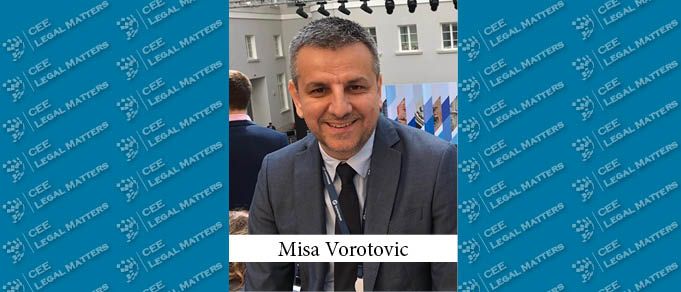An interview with the Belgrade-based Senior Counsel CEE at Philip Morris International
CEELM: Can you walk us through your career leading you up to your current role?
Misa: Right after law school I started as a legal trainee in a Law Firm Dragan Rasic in Belgrade. There I learned a lot about the fields of civil and commercial law. I worked at that small law firm for three years. After that I had my own law office for approximately two years, where I continued to build my expertise in the fields of civil and commercial law, but also worked a lot in the real estate sphere.
In the following years I mainly worked in the banking sector, helping banks in their legal affairs as both in-house lawyer (with UniCredit Bank) and outside counsel (with the Roka & Partners law firm and CMS Belgrade).
Some 14 years ago I joined the legal team of Phillip Morris International as Counsel for Serbia and Montenegro. In less than a year I became the head of the legal department for those markets. In early 2016, I become Head of Legal SEE for PMI, covering six markets in the Balkans.
CEELM: What are the most significant changes you’ve seen in Balkan legal markets over your more-than-20-year career?
Misa: When I started, back in 1997, there were no big law firms in Belgrade and Serbia. There were only offices with one lawyer, or at most just a few. Also, there was very little specialization around those days. Today we see more and more specialized lawyers, on the one hand, and much more sizable law firms, gathering different types of legal specialists on the other hand, in order to be able to respond to growing needs of their clients in different areas of laws, both in terms of the quantity and quality of legal work.
CEELM: Tell us about your legal team at Philip Morris International in Serbia. How big is it, and how is it structured?
Misa: We cover six markets (Serbia, Montenegro, Kosovo, Macedonia, Bosnia & Hezegovina, and Albania). We have six lawyers on our team. The work is split predominantly per territory. All the lawyers are based in Serbia (in the cities of Belgrade and Nis). Some of them are specialized in laws of other countries – for example Macedonia or Montenegro. We have a pretty flat structure, which, I believe, fits small types of organizations like ours, so almost all the lawyers report directly to me. In each market we have law firms that support us, and the lawyers from our team that are responsible for those markets work directly with those outside counsels. Less often, and in some specific areas of law, we have developed in-house experts that support other business functions on functional principles, irrespective of the territory.
CEELM: Are there changes you would like to see in Serbian law (or other legal regimes in SEE) that would make things easier for PMI?
Misa: All SEE markets adapt their regulations in line with their specific EU accession paces. We encourage all changes which are in line with EU practices and which take into account the specifics of different industries.
As in any other sphere, there are always things that can be improved. For example, the current Serbian Law on Conversion of Usage Right into Property on Construction Land with a Fee, especially in combination with the Law on Planning and Constructing, is unfavorable for those investors who bought Serbian companies under the Privatization Law. These companies cannot use their earlier entitlements and develop the land on which they have the right of use, as they cannot get the necessary construction permit. So, despite the significant amount they paid initially, and additional investments they’ve made since, these companies cannot fully exploit the rights they acquired, without paying additional and often very significant fees. This is not a best practice and does not help to promote further investments, as for all investors, especially the foreign ones, security of ownership rights is among the most important things to assess when deciding to invest. Things can definitely improve there.
On the other hand, I believe it is commendable that local legislation is more and more positive towards work from home and similar modern forms of work arrangements. That trend should be encouraged, as it can benefit both employees and employers.
CEELM: What is your typical day at work like?
Misa: The beauty of my job is that there are no typical days at work. Each day is a story of its own. The work is so dynamic so that it is very difficult to plan anything. I travel a lot. In SEE alone I have around ten locations that I need to visit several times during the year, including our own or our distributors’/partners’ offices or factories in Belgrade, Nis, Skopje, Prilep, Tirana, Pristina, Podgorica, Sarajevo, and Banja Luka, among other places. Also, I travel very often to our HQ in Lausanne, and several times during the year we have meetings in other places around Europe and the world. So, I may say that my office is very often in an airplane, hotel, or even train. I work a lot on my smartphone and talk a lot over the phone. This is today’s reality, especially in multinational companies. At times it is difficult, most of the time it’s just interesting and exciting!
CEELM: Was it always your plan to go (and stay) in-house?
Misa: It was actually never my plan to go in-house – and then, when it happened, it was not my plan to stay. When I was a kid in primary school my dream was to become a lawyer and to have my own law firm. I was not dreaming of a big law firm because, as I explained above, big law firms did not exist at the time in Serbia. Over the years I worked towards making that dream come true, which at a later stage became my goal. I formally fulfilled my dream probably too early (in my late 20s). It was not easy to sustain the office on my own, and I first joined a bigger law firm, then, soon after, I received a call from a bank. The financial offer was good and the salary was stable, so I accepted. After a while, I told myself that the in-house position was not for me and I joined a big law firm again.
After a while, although I had a great time being a member of a big law firm, I received an offer from PMI. I decided to accept the in-house challenge once again. I felt this time it could be different, and better. But this time I was more cautious. I even kept my status as an outside counsel alive for two more years (the maximum possible at the time). Now, after 14 years at PMI, I feel all my decisions were right. It is OK to try things in earlier stages of your career and to change more often in order to understand what suits you and to accumulate different types of experience. Today, I see the value of being both external and in-house, so I would recommend that each lawyer try both sides. Having experience on one side gives you a more complete view when you are on the other side, and vice versa.
Still, I am keeping my dream alive. (Smiles)
CEELM: What was your biggest single success or greatest achievement with PMI in terms of particular projects or challenges? What one thing are you proudest of?
Misa: Well, things that you are the proudest of and your biggest achievements are normally the things, at least in our profession, that you should not speak openly about, because they are very confidential. But, nevertheless, I decided to open myself to your readers more than normal (smiles). So, for this occasion, I would pick our deal in Macedonia. We have a joint venture with a state-owned factory there. We have a Master Joint Venture Agreement and almost a dozen underlying agreements under its umbrella. Hundreds of pages of legal documents, as you may imagine. Cross-referencing all around – in and out! I dedicated almost a year to finalizing the deal (while continuing to manage all the other aspects of my job). It was challenging from various sides: in terms of internal and external relationships but also legally because the deal itself was very complex. The thing I am proudest of is that in most of the negotiating sessions I was the only one from my company representing both the legal and the business side – which was not the case on the other side of the table. It was difficult, but the deal is still on and is paying dividends for both sides. Recently, we celebrated five years of the JV, and I felt the drinks I had at the party were among the most-deserved in my entire PMI career.
CEELM: What one person would you identify as being most important in mentoring you in your career – and what in particular did you learn from that person?
Misa: Definitely Dragan Rasic, my first principal in the law firm where I served as a legal trainee. That man was a walking encyclopedia of law. His expertise was so strong that other (good and experienced) lawyers used to call him to ask for help with strategy in their own cases. He taught me how to approach each legal issue. I simply learned that being lawyer is an art and a craft at the same time. He also taught me about life – how to drive a car for example. I had a great and caring father from whom I learned a lot of important things, but for those three years of my traineeship I felt like I had a second father.
CEELM: On the lighter side, what is your favorite book or movie about lawyers or lawyering?
Misa: The Devil’s Advocate. Vanity is truly one of the features of lawyers, especially those that are often in the court. The movie pushed me to look at my profession from the other side – more modest, honest, and down-to-earth. This is especially important in-house, when you are not a big star. The only star in companies is the business itself (in our case commercial roles), so most of the time your role is to contribute and do your best despite not being in the spotlight. There is not much room for vanity there.
This Article was originally published in Issue 6.11 of the CEE Legal Matters Magazine. If you would like to receive a hard copy of the magazine, you can subscribe here.

















